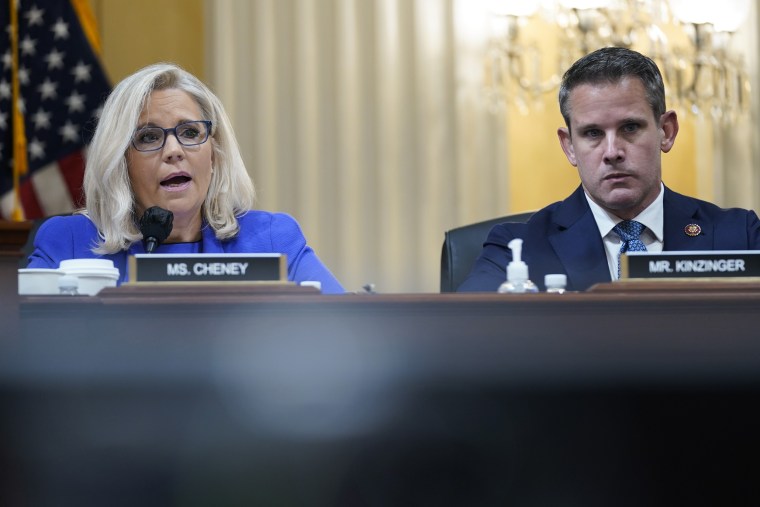As the House committee investigating the Jan. 6, 2021 riot at the Capitol wraps up its work, four members of the panel are also wrapping up their time in Congress.
The nine-member committee is holding its final public meeting on Monday, where it is expected to vote to adopt its final report on the attack, and to recommend criminal referrals, including at least three related directly to former President Donald Trump. Republicans are expected to dissolve the committee when they take control of the House next year.
While five members will be returning for the next Congress, four will not. Here are the four lawmakers — two Republicans and two Democrats — who will not be serving in the House next year:
Rep. Liz Cheney, R-Wyo.
Cheney, a staunch Trump critic, is leaving Congress after losing her primary to Republican Harriet Hageman by 37 percentage points. Trump endorsed Hageman, an attorney, and made Cheney a top target.
But Cheney’s political career may not be over. After losing her primary in August, Cheney told NBC’s TODAY Show that she is “thinking about” a run for the White House.
“I believe that Donald Trump continues to pose a very grave threat and risk to our republic. And I think that defeating him is going to require a broad and united front of Republicans, Democrats and independents, and that’s what I intend to be a part of,” Cheney said at the time.
Rep. Adam Kinzinger, R-Ill.
The six-term congressman is the only other Republican on the panel, and he has also been a sharp critic of Trump. He announced his retirement amid a new congressional map. His district was carved up thanks to Illinois losing a House seat because of population loss.
Kinzinger told the Chicago Sun-Times that he’ll continue to be involved with his PAC, Country First. He said he could be interested in giving paid speeches or serving as a TV commentator, and he’s considering writing a book. Kinzinger also said he’s interested in running for office again, potentially for president, governor or Senate.
“But I’m also 44, and I’ve got plenty of time,” he said.
Rep. Elaine Luria, D-Va.
First elected in the 2018 Democratic wave, Luria lost re-election in the swingy 2nd District in November. Republican Jen Kiggans, who, like Luria, is a Navy veteran, defeated Luria by 3 points.
Luria leaned into her work on the Jan. 6 committee in her campaign even though President Joe Biden would have won her district by just 2 points had the new congressional lines been in place in 2020, per calculations from Daily Kos Elections. She is one of the few Democrats who focused directly on the Jan. 6 attack in her campaign, and she cast her re-election as part of a battle for democracy.
“If standing up for what’s right means losing an election, so be it,” she said in her closing TV ad.
Rep. Stephanie Murphy, D-Fla.
Murphy was first elected to the House in 2016, defeating longtime GOP Rep. John Mica in the competitive 7th District, which includes part of Orlando. She was the first Vietnamese-American woman elected to Congress.
A moderate lawmaker, Murphy weighed running for Senate in 2022, but ultimately decided not to run to avoid a potentially bruising Democratic primary. Last year, Murphy announced that she would not seek re-election to the House, saying, “As a mom of two young children, my time away from them has been hard.”
Asked what’s next for her, Murphy told News 6 in late November that she’s looking forward to spending time with her family and a “more sane pace of life.” But, she added, “I believe in public service. I always have. And I’m sure I’ll find ways to serve my community and my country.”

